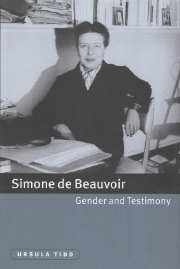Book contents
- Frontmatter
- Contents
- Acknowledgements
- List of abbreviations
- Introduction
- PART I BECOMING THE SELF
- PART II WRITING THE LIFE
- 3 Narratives of self-representation
- 4 Negotiating autobiography
- 5 Writing the self – Mémoires d'une jeune fille rangée
- 6 Bearing Witness with the Other, bearing witness for the Other
- 7 Writing the Other
- Epilogue
- Notes
- Bibliography
- Filmography
- Index
- CAMBRIDGE STUDIES IN FRENCH
5 - Writing the self – Mémoires d'une jeune fille rangée
Published online by Cambridge University Press: 22 September 2009
- Frontmatter
- Contents
- Acknowledgements
- List of abbreviations
- Introduction
- PART I BECOMING THE SELF
- PART II WRITING THE LIFE
- 3 Narratives of self-representation
- 4 Negotiating autobiography
- 5 Writing the self – Mémoires d'une jeune fille rangée
- 6 Bearing Witness with the Other, bearing witness for the Other
- 7 Writing the Other
- Epilogue
- Notes
- Bibliography
- Filmography
- Index
- CAMBRIDGE STUDIES IN FRENCH
Summary
This chapter offers a reading of the Mémoires as an ironic text which seeks to communicate to a benevolent reader, as other self, how Beauvoir sought to subvert the discourses of class, religion, gender and sexuality to which she was subjected, simultaneously writing herself out of the contemporary political context of the Algerian War. It will be argued that Simone's erotic attachment to Zaza represented in the Mémoires enables her to envisage an alternative to the monolithic bourgeois truth which seeks to discipline Simone into ‘une jeune fille rangée’.
In the Mémoires, Beauvoir constructs a self in opposition to hegemonic discourses of social class, religion, gender and sexuality. In the subsequent volumes of her autobiography, she represents the self as shaped by relationships with others and situated at the interstices of personal and collective history. In this and the following chapter, a shift will be charted from the disciplined self of the Mémoires to the multiple, discontinuous subject represented in the subsequent volumes of memoirs, who increasingly relinquishes the space of personal ‘histoire’ to achieve autobiographical agency as witness to history.
COMING TO AUTOBIOGRAPHY
Beauvoir's intention to write her autobiography can be traced back to the immediate post-war period. She began taking notes for a projected autobiography in 1946. In La Force des choses, she relates how, sitting in Les Deux Magots at a loss for something to write, she asked Giacometti's advice.
- Type
- Chapter
- Information
- Simone de Beauvoir, Gender and Testimony , pp. 106 - 129Publisher: Cambridge University PressPrint publication year: 1999



